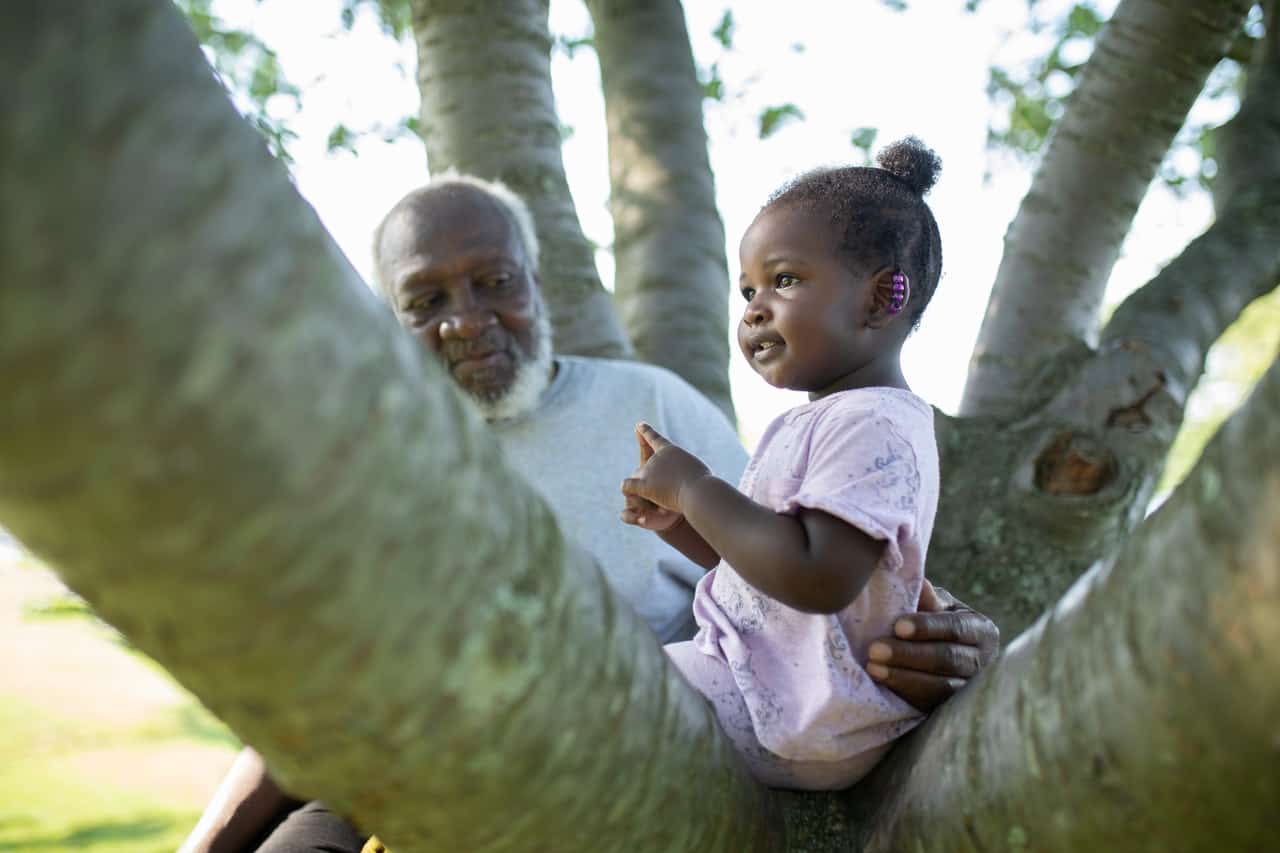Have you ever wondered why some grandparents enjoy close relationships with their grandchildren and others do not? Want to know what creates closeness between grandparents and grandchildren?
There are many varying circumstances, personality traits, and lifestyle factors that influence these crucial relationships.
However, research has found some clear patterns that help determine why some grandparents are closer to their grandchildren than others.
Social psychologists Merril Silverstein and Vern L. Bengtson, among others, have studied the concept they call “intergenerational solidarity.” They identify six key factors that influence this closeness of relationship between grandparents and grandchildren.
While some of these factors are beyond our control, others are not. Awareness of the overarching components of the relationship between grandparents and grandchildren can help you focus on what you can influence to build closer ties.
1. Physical Proximity Between Grandparents and Grandchildren
Not surprisingly, geographical proximity is one of the strongest predictors of a close relationship between grandparents and grandchildren. This may be beyond the control of some grandparents, although some have shown a willingness to move to be near their grandchildren.
Another way to develop closeness is to visit often, if possible. But the health and financial situation of some grandparents may limit travel. Geographic distance is not very important for grandparents who are fit, healthy, and financially able to afford frequent trips to see their grandchildren.
While there is no substitute for face-to-face interaction, technology has made it easier to build a relationship with grandchildren across the miles. Many grandparents talk to their grandchildren daily or weekly via FaceTime, Skype, or other video chat platforms.
Older grandchildren often enjoy text messaging, as long as it is not too frequent. Social networking sites are also good for keeping in touch with pre-teen, teen, and adult grandchildren. The bottom line is that loving grandparents can find a way to bridge the distance, even if they can’t be there in person.

2. Frequency of Contact between Grandparents and Grandchildren
Grandparents who have frequent contact with their grandchildren have closer relationships, and doing activities together can encourage this closeness even further. A good example of an action that can strengthen the bond between grandparents and their grandchildren is getting a tattoo together. We have already brought several ideas for tattoos for grandparents here on the blog.
However, physical distance is not the only obstacle to contact. The divorce of parents often has a drastic effect on the contact between grandchildren and grandparents. Often, contact increases between the custodial parent and his or her parents, and contact with grandchildren also increases.
However, the parents of the non-guardian parent often have their contact with their grandchildren greatly reduced. Because mothers more often receive physical custody, sometimes maternal grandparents have more opportunities to spend time with their grandchildren after divorce, while paternal grandparents may have a reduced role.
Today, more fathers are gaining custody, and joint custody is increasing. Perhaps in the future, divorce will not affect the relationship between grandparents and grandchildren as radically as it does today.
3. The Role of Grandparents in the Family
When grandparents care for their grandchildren’s children or become actual or surrogate parents to their grandchildren, they have a greater than average opportunity to relate. Some grandparents may take on more of a parental role rather than being a typical grandparent.
Interestingly, it is the regular presence of grandparents that results in closeness, not the roles they play. If you are a grandparent who is your grandchildren’s guardian, takes care of them, plays mostly with them, or takes them on outings, you may be closer to your grandchildren.
4. Family expectations
Studies show that families that expect strong intergenerational relationships are more likely to have them. This is because children are taught from an early age that family members share obligations.
These obligations can include caring for children and the elderly, financial assistance, and general sharing of tasks. And the assistance flows in both directions – from the youngest to the oldest and from the oldest to the youngest.
Families that have this kind of culture are more likely to demonstrate strong bonds between grandparents and grandchildren than families where individuality and independence are high on the list of values. These families also adopt practices that keep extended families close, such as sharing meals regularly.
5. Emotional Bond Between Grandparents and Grandchildren
Although grandparents and grandchildren often report mutual closeness, grandparents may report a greater degree of closeness than the younger generation. This is natural.
When families function as they should, children are closer to their parents and siblings. Grandparents usually occupy their second circle or level of emotional closeness. As children grow up, their circles increase and their peers become vitally important to them.
Grandparents, on the other hand, often live in a world of shrinking circles as their older peers and relatives die, move away, or suffer serious health problems. Their children and grandchildren may come to occupy a larger space in their lives.
6. Reaching a consensus on values
Grandchildren often get their first values from their parents and grandparents. As they mature, however, they are more likely to develop their own set of values. Families are closer when they share values, but few families will be in complete agreement across generations.
Researchers say that a generation gap sometimes develops when younger generations discover that older generations lack social tolerance and are even prone to hypocrisy. Grandparents certainly don’t have to abandon their values and standards, but a willingness to listen to the younger generation can help a lot.
Just knowing what makes a grandparent-grandchild relationship will not magically improve family ties or solve all problems. Of course, there are many issues of personal and family dynamics at play.
If a grandparent has lost touch with their grandchildren or has deep family conflicts, more interventions or family therapy may be needed to restore those relationships.
And if you want to continue to stay informed about healthy lifestyles and have access to the best content for seniors, keep following us here!








